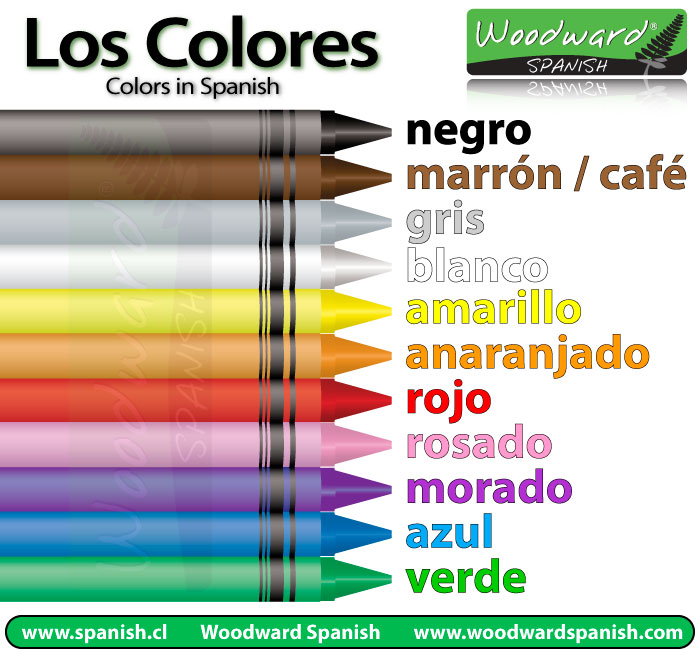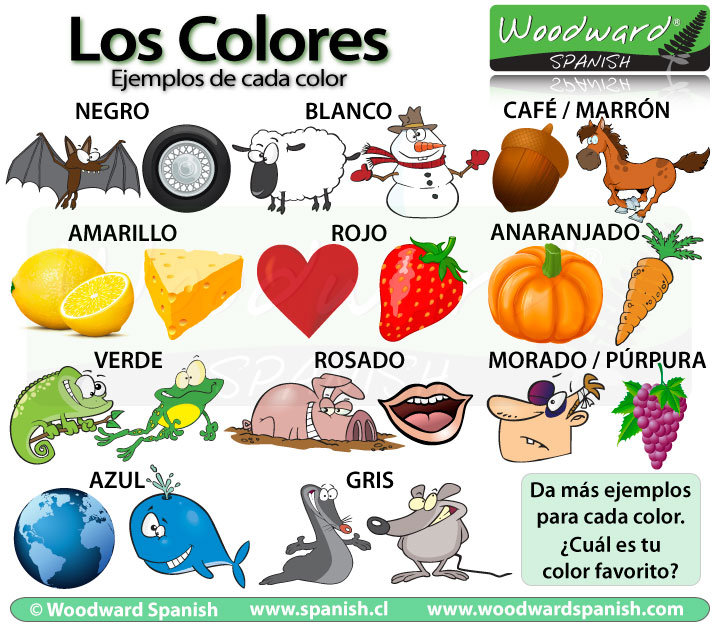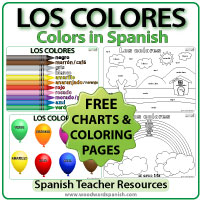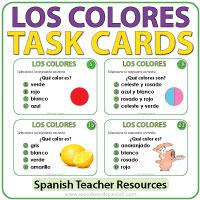Is Verde Masculine Or Feminine
Colors in Spanish
Castilian Vocabulary

The main colors in Spanish are:
- negro - black
- marrón / café - brown
- gris - gray / grey
- blanco - white
- amarillo - yellow
- anaranjado / naranjo - orange
- rojo - carmine
- rosado - pink
- morado / púrpura - purple
- azul - blue
- verde - greenish
You lot will discover that for some colors there are two unlike words for it. Which one you apply depends on the country you are in.
Colores have unlike forms
Colors are adjectives that must agree with the gender and number of the noun.
It is importante to remember that the colors that terminate in -O or -A take a masculine and feminine form equally well as a singular or plural form and must coincide with the noun (or subject field).
For example in that location are 4 forms of the color Blanco.
- Un sombrero blanco - (Blanco is in masculine and singular class, just like the word it describes)
- Unos sombreros blancos - (Blancos is in masculine and plural form)
- Una casa blanca - (Blanca is in feminine and singular form)
- Unas casas blancas - (Blancas is in feminine and plural form)
With words that don't end in -O or -A (like verde and gris) don't have a change in the masculine or feminine form. You lot do however have to add the -S or -ES for its plural course.
- Un sombrero verde
- Unos sombreros verdes
- Una casa verde
- Unas casas verdes
A color tin can besides be a noun in a sentence
- El rojo enfurece a los toros.
Word club with colors
one. The verb SER + color (Ser - because the colour won't change or information technology has always been that colour)
- Mi motorcar es verde
- Su mochila es amarilla
2. The verb ESTAR + color (Estar - It is simply temporarily this color, it may change color tomorrow)
- Mi ojo está rojo (my eye normally isn't this colour, maybe it is infected)
- El cielo hoy está azul (today the sky is blue though it might exist cloudy tomorrow)
iii. The noun + color
- La alfombra roja
- Los lapices azules
Claro - Oscuro - Fuerte
When we talk about colors, we can also include different tones, shades and intensities by using the following expressions:
- claro = light
- oscuro = dark
- fuerte = bright
Claro is the reverse of Oscuro
Fuerte is a vivid intense colour that is easy to see.
- Verónica tiene ojos verdes oscuros.
- Su pelo gris claro la hacía ver mayor.
- Su corbata rosada fuerte no le queda bien.
You will observe that the words claro, oscuro and fuerte go after the color.
Spanish has a discussion specifically used for the colour light blue ... celeste.
Typical things of each color
The following is a list of the things that are typically associated with each colour:
(Below you will find a picture with more examples)
Rojo: frutillas, vino, sangre, rosas.
Anaranjado: zapallo, zanahoria, pelota de basketball, naranja.
Amarillo: queso, sol, mantequilla, limón.
Azul: cielo, océano, pitúfo
Verde: hoja, árbol, pasto, rana, moco
Negro: murciélago, noche, neumático.
Blanco: papel, azúcar, leche.
Rosado: cerdo, lengua, dulce de algodón.
Marrón: madera, cigarro, tierra.
Gris: rocas, plomo, plata.
Morado: uva, hematoma (moratón)
What other typical things can you lot add to each color?

Next Activities
Try our interactive Spanish vocabulary games:
Colores one - (Picture game) Names of colors
Colores two - (English to Castilian translation game) How do you lot say x in Castilian?
Colores 3 - ¿De qué colour es 10? (What color is X?)
Ver nuestra página de los colores en español.
Para Profesores y Padres


If y'all found this Spanish vocabulary nigh Colors useful, let others know nearly information technology:
Is Verde Masculine Or Feminine,
Source: https://www.spanish.cl/vocabulary-lists/colors.htm
Posted by: farmerreanday.blogspot.com


0 Response to "Is Verde Masculine Or Feminine"
Post a Comment